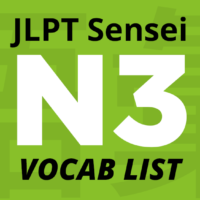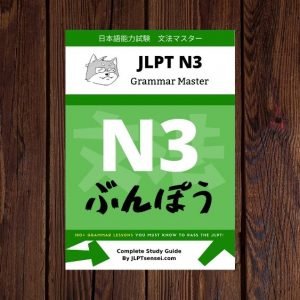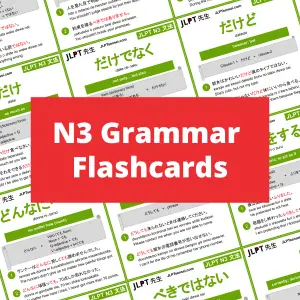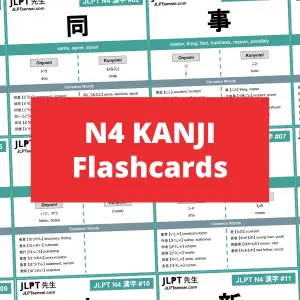This is a Japanese vocabulary list of Verb(s) you need to know in order to pass the JLPT N3.
Click on any of the words below to see the full vocabulary lesson, including example sentences.
References:

| # | 動詞 | Verb | Meaning |
|---|---|---|---|
| 1 | 明ける | akeru あける | to dawn,to become daylight |
| 2 | 暗記 | anki あんき | memorization; learning by heart |
| 3 | 分析 | bunseki ぶんせき | analysis |
| 4 | 出会う | deau であう | to meet (by chance); to come across; to run across; to encounter |
| 5 | 読書 | dokusho どくしょ | reading |
| 6 | 努力 | doryoku どりょく | effort; exertion; endeavor; hard work; striving |
| 7 | 不足 | fusoku ふそく | insufficiency; shortage; deficiency; lack; dearth |
| 8 | 外出 | gaishutsu がいしゅつ | going out; outing; leaving (one's home, office, etc.) |
| 9 | 学問 | gakumon がくもん | scholarship; study; learning |
| 10 | 学習 | gakushuu がくしゅう | study; learning; tutorial |
| 11 | 販売 | hanbai はんばい | sales; selling; marketing |
| 12 | 発明 | hatsumei はつめい | invention |
| 13 | 外す | hazusu はずす | to remove; to undo; to drop; to miss |
| 14 | 一言 | hitokoto ひとこと | single word; a few words; brief comment |
| 15 | 一致 | icchi いっち | agreement; union; match; coincidence |
| 16 | 邪魔 | jama じゃま | hindrance |
| 17 | 会合 | kaigou かいごう | meeting; assembly; gathering; association |
| 18 | 開始 | kaishi かいし | start; commencement; beginning; initiation |
| 19 | 記念 | kinen きねん | commemoration; celebration; honoring the memory of something |
| 20 | 気に入る | kiniiru きにいる | to like; to take a liking to |
| 21 | 記入 | kinyuu きにゅう | entry; filling in; filling out |
| 22 | 記憶 | kioku きおく | memory; recollection; remembrance |
| 23 | 期待 | kitai きたい | expectation; anticipation; hope |
| 24 | 転ぶ | korobu ころぶ | to fall down; to fall over |
| 25 | 訓練 | kunren くんれん | training; drill; practice; discipline |
| 26 | 協力 | kyouryoku きょうりょく | cooperation; collaboration |
| 27 | 吸収 | kyuushuu きゅうしゅう | absorption; suction; attraction |
| 28 | 学ぶ | manabu まなぶ | to study (in depth); to learn; to take lessons in |
| 29 | 満足 | manzoku まんぞく | satisfaction; contentment; sufficient; enough |
| | |||
| 30 | 味方 | mikata みかた | friend; ally; supporter; taking sides with; supporting |
| 31 | 入場 | nyuujou にゅうじょう | entrance; admission; entering |
| 32 | 収める | osameru おさめる | to supply; to dedicate; to make an offering; to pay |
| 33 | 連続 | renzoku れんぞく | continuation; succession; series |
| 34 | 利益 | rieki りえき | profit; gains; benefit |
| 35 | 留学 | ryuugaku りゅうがく | studying abroad |
| 36 | 左右 | sayuu さゆう | left and right |
| 37 | 成長 | seichou せいちょう | growth; development; growing up; becoming an adult |
| 38 | 刺激 | shigeki しげき | stimulus; impetus; incentive; encouragement; motivation; provocation; excitement; thrill |
| 39 | 進学 | shingaku しんがく | entering a higher-level school (often university) |
| 40 | 使用 | shiyou しよう | use; application; employment; utilization. |
| 41 | 証明 | shoumei しょうめい | proof; verification; certification |
| 42 | 招待 | shoutai しょうたい | invitation |
| 43 | 集中 | shuuchuu しゅうちゅう | concentration; focusing; centralization; integration |
| 44 | 収穫 | shuukaku しゅうかく | harvest; crop; fruits (of one's labors) |
| 45 | 徹夜 | tetsuya てつや | staying up all night |
| 46 | 取れる | toreru とれる | to come off; to be removed; to be obtainable |
| 47 | 取り上げる | toriageru とりあげる | to pick up |
| 48 | 通学 | tsuugaku つうがく | commuting to school; school commute |
| 49 | 受け取る | uketoru うけとる | to receive; to understand |
| 50 | 運転 | unten うんてん | operation; driving |
| 51 | 売れる | ureru うれる | to sell (well) |
| 52 | 分ける | wakeru わける | to divide; to split; to part; to separate |
| 53 | 悪口 | waruguchi わるぐち | slander; bad-mouthing; abuse; insult; speaking ill (of) |
| 54 | 輸入 | yunyuu ゆにゅう | import; importation; introduction |
| 55 | 輸出 | yushutsu ゆしゅつ | export; exportation |
JLPT N3 vocab List total: (55)
Currently viewing page 1 of 1
JLPT N3 Study Guide
JLPT N3 Grammar Master [e-book]
Complete Study Guide
This e-book includes every grammar point you need to know in order to pass the JLPT N3, with detailed usage notes and numerous example sentences.
Pages: 378.
Grammar lessons: 182.
N3 Flashcards
*NOTE* Officially, there are no kanji, vocabulary, or grammar lists for the JLPT. As a result, it is not possible to be certain which kanji, words, or grammar will or will not appear in a given test. Our study lists are based on prior test data and comparisons with other available lists of JLPT kanji, vocabulary, grammar, etc.


